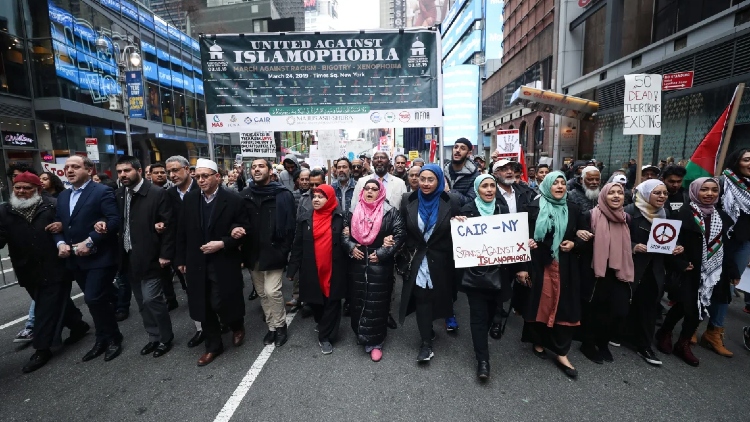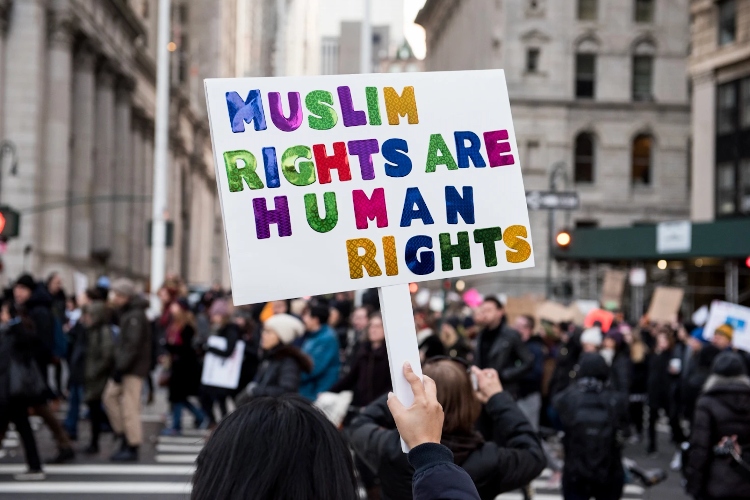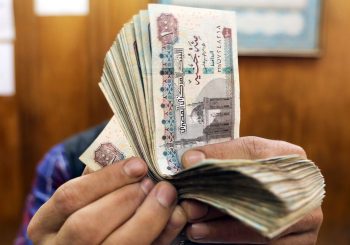In the wake of escalating incidents of prejudice and discrimination against Muslims, the International Day to Combat Islamophobia serves as a crucial moment for reflection and united action against the growing wave of hatred.
Islamophobia, encompassing fear, prejudice, and hostility towards Muslims, manifests in various forms of harassment and discrimination, both online and on-ground.
Rooted in institutional, ideological, and religious animosity, Islamophobia often targets symbols of Muslim identity, which are wrongly perceived as a threat to Western values.
The designation of 15 March as the International Day to Combat Islamophobia holds significant meaning as it coincides with the anniversary of New Zealand’s Christchurch mosque shootings in 2019. This tragic event, in which 51 people were killed during Friday prayer, serves as a stark reminder of the urgent need for global dialogue and tolerance.
Islamophobic Incidents in The United States
Since the start of the war on Palestine, both the United States and Europe have experienced a troubling rise in Islamophobic incidents, creating a distressing reality for Muslim communities.
The Council on American-Islamic Relations (CAIR) documented a staggering increase in reported anti-Arab and anti-Muslim bias incidents. Since 7 October, CAIR received 1,283 requests for help and reports of bias, reflecting a troubling 216 percent surge compared to the previous year’s statistics.
These incidents range from verbal harassment to physical violence, creating an atmosphere of fear and vulnerability within the Muslim diaspora worldwide.
For example, on 15 October, Wadea Al-Fayoume, 6-years-old, was fatally stabbed at his Illinois home in what police said was an anti-Muslim hate crime.
Also in Illinois, a man was charged with conducting a hate crime when he demanded that two Muslim men leave the USA; he threatened to shoot them on 17 October, NBC Chicago reported.

It is also crucial to highlight the case of Mohamed Hussein, a 24-year-old Egyptian Muslim food vendor in New York City, who endured a series of distressing incidents captured on video, wherein he was subjected to racial abuse by Stuart Seldowitz, a former high-ranking U.S. official.
Seldowitz, who served in various roles spanning five presidencies, including as a National Security Council director, was filmed making derogatory remarks, including calling Hussein a “terrorist” among many other Islamophobic and xenophobic remarks on multiple occasions, as seen in videos circulating on social media.

Islamophobia grips Europe as well
In Europe, the rise in Islamophobic incidents since the start of the war on Palestine has also been alarming.
On 8 October, Lancashire police launched a hate crime investigation, following the dumping of a pig’s head at a proposed mosque in the market town of Barnoldswick.
Additionally, Haleem Kherallah, an owner of Palestinian eatery Shakeshuka, said his central London restaurant had received 20 abusive phone calls on 9 November 2013, with two members of staff having left in fear for their safety.
On 17 November 2023, Islamophobic graffiti has been sprayed on the Pessac Mosque in Girone, France, sparking growing fear among the French Muslim community of a rise in hateful crimes.
In London, Islamophobic offenses increased by 140 percent according to the Metropolitan Police.
Representatives of European Union countries expressed their concern and solidarity with Muslim citizens in a joint statement on 29 November 2023.
On 20 December 2023, the French Muslim Council reported receiving dozens of letters containing threats or insults, and 14 mosques were vandalized following Israel’s attacks on Palestine.

Through collaborative efforts, governments can use the occasion of the International Day to Combat Islamophobia to acknowledge the pressing need and dismantle systemic biases that contribute to the persistence of Islamophobia and other forms of discrimination.







Comment (1)
[…] News Source: egyptianstreets.com […]